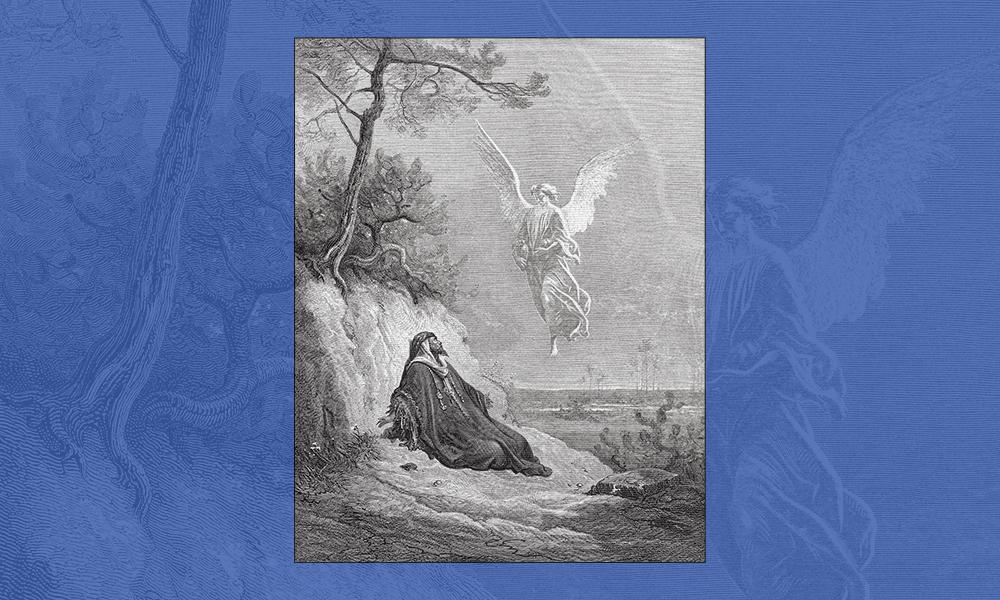
Elijah, the Prophet: A Guide in Lent
The Prophet Elijah was involved in two of the more dramatic events described in the First Book of Kings in the Old Testament. Both events took place on mountains, places on earth considered closer to God. On Mount Carmel, Elijah defeated Baal, a pagan idol. On Mount Horeb, he renewed his relationship with the true God of Israel.
A contest on Mount Carmel
The King and Queen of Israel, Ahab and Jezebel, were followers of Baal, the Canaanite god of storm and fertility. In opposition to Baal, the prophet Elijah declared a drought in Israel. “There shall be neither dew nor rain during these years, except by my word” (1 Kings 17:1). King Ahab assembled all of Israel on Mount Carmel to witness a contest between Baal and the God of Israel. Elijah challenged the people: “How long will you straddle the issue? If the Lord is God, follow Him; if Baal, follow him” (1 Kings 18:21).
Elijah instructed the worshipers of Baal to choose a young bull, cut it into two pieces and place one piece on a pile of wood. They were not to light a fire, but to call on their god, Baal, to ignite the wood. The prophets of Baal prayed. They hopped around the altar, but there was no response. Elijah taunted them: “Call louder, for he is a god and may be meditating, or may have retired, or may be on a journey” (1 Kings 18:27). The text concludes, “But there was not a sound; no one answered, and no one was listening” (1 Kings 18:29).
Then Elijah prepared an altar on which he placed the other piece of the young bull. He ordered water to be poured on the holocaust and the wood. He then summoned the God of Abraham, Isaac, and Jacob to show the power of Israel’s God. At this prayer, fire came down and destroyed the holocaust, the wood, and the altar. Nothing was left. Seeing this, the people proclaimed, “The Lord is God! The Lord is God” (1 Kings 18:39)
The problem with idols
An idol need not be a nature god like Baal. An idol can be a good we ask to be a god. For example, if I ask my job or some accomplishment to provide all the meaning and worth I deeply desire, I am asking too much. Only God can fulfill our deepest desires.
Idols never satisfy. Temporarily, idols produce satisfaction, but they are insubstantial food for the hungers of the heart. Possessions, titles, reputations, money, achievements all may be very appropriate in the life of an individual. But, our need is for a true center in our lives, for a source of worth and meaning that no trophy can provide.
Our true value comes from the Lord who loved us into life and who accompanies us on our journey. Until we engage the transcendent Presence that haunts our lives, and live into that relationship, our lives are insubstantial. A small god results in a small person. I cannot grow past my god. And I am hurting whomever or whatever I am asking to be my god.
Elijah challenges us, “How long will you straddle the issue?”
Mount Horeb, the mountain of God
After his great triumph, Elijah was still in trouble. Queen Jezebel was pursuing him. He became despondent, sat down in a deserted place, and prayed for death. But the Lord had further need of his services. An angel came and ministered to Elijah, saying to him, “Get up and eat!” With revived spirits, Elijah traveled 40 days and 40 nights to Horeb, “God’s mountain.”
Elijah’s journey to Horeb is reminiscent of Moses’ journey in the desert to Sinai. It is thought the two mountains may actually be the same place. On Sinai, Moses made a covenant with the Lord. On Mount Horeb, Elijah renews his relationship with the Lord.
Elijah is invited to stand at the mouth of his cave, and the Lord will pass by. Standing outside the cave he experiences, first, a mighty destructive wind, and then an earthquake, and then a fire. The Lord was in none of these forces of nature. But then came “the sound of thin silence” (1 Kings 19:12). In this absence of sound, Elijah “hears” the presence of God. The noise and distraction of idols have died down. Elijah is now a person available to the Lord. God has been waiting in the silence to have Elijah’s attention. The prophet finds a reason to live!
True God, true self
Renewal occurs by returning to one’s roots and re-establishing a relationship with the Lord. Lent is a time for acknowledging idols, our false gods, and returning to the service of the true God. If we establish times of quiet for prayer and reflection, we may also come to know ourselves better. The true God reveals to us our true selves.
The Carmelite Order, originating in a valley on Mount Carmel in the 1200s, has adopted the claim of the Prophet Elijah for its motto: “With zeal I have been zealous for the Lord God of Hosts” (1 Kings 19:14).



